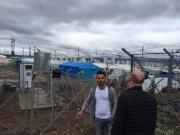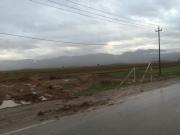It is the fifth anniversary of the war in Syria.
I am in Iraq with several colleagues and under the auspices of Christian Aid. It is a brief visit, but we are covering a lot of ground (some of which has got caked in our shoes).
I will write more when I am back in England and have had time to assimilate the experiences and reflect on their import as well as their impact. For now, however, here is a brief account so far.
The narrative in the UK is that refugees (mostly from Syria) and internally displaced people (IDPs) should be encouraged to go home once ISIS has been defeated and expelled from this land. This is understandable. After all, (a) shouldn't people naturally want to return to their homeland, and (b) we mustn't – in the words of one Christian leader we met – “complete the policy of Daesh by cleansing Iraq of Christians”. Yet, “home no longer exists for thousands of people, and we cannot simply condemn Christians to remain just in order to keep a presence there.
Today we spent time in an IDP camp that houses 4,203 people (comprising 791 families, 2,087 children – 672 families being Yezidi and 90 Christian). There are 3 million IDPs in Iraq of which 450,000 are in the region we are visiting – 193,000 in the eighteen camps here.
Numbers numb. So, here is one family's story, told as we sat in the single-compartment portakabin that houses eight people.
The two younger men were taken by Daesh to Syria, their families divided. They were constantly on the move. Eventually the men escaped, running by night and hiding by day. After five days and nights they came to a village in Sinjar and occupied an empty house: 25 people of all ages. Capture would have meant death to the men and slavery to the women and girls. They had no food. Their only drinking water was the rain.
Forced to flee again, they were caught up in the siege of Sinjar Mountain from where they among the fortunate ones to be airlifted to safety. They are now in the camp, three hours from where their homes had been before Daesh brought death and destruction and unimaginable fear.
Among the many questions we asked was the obvious one: do you want to go home?

The older men want to go home, but will only do so if they are guaranteed complete security from their Arab neighbours. Trust built over centuries died in a single day. The younger men see no future and no security: they want to go to Germany where some of their family already live. They feel safe in this well-run camp, but the future is uncertain. They own nothing.
There was one young woman in the room, but she sat silently and just occasionally looked up. I asked our interpreter if the young woman would like to say anything to us. She said simply that her two sisters had been taken by Daesh and, upon their eventual escape, were taken to Germany. Women and girls in such circumstances appear to be automatically taken out of the country. It is not hard to imagine why.
A policy of resettlement in their original homes only makes sense from a distance. What might it actually mean for women whose family has endured fearful threat, violence and loss before being been scattered? Or for those whose home no longer exists: relationships are dead, houses are destroyed or occupied by former neighbours, where there is no economy and no infrastructure?

I don't intend to draw political conclusions from this – I simply record the story told to us in a single room in a large camp under stormy skies and ferocious rainfall. Tomorrow we go to a refugee camp and the story will become more complicated again.
It is not hard to see what pushes these people to want to leave. It is hard to see what might pull them to stay.
More anon.

